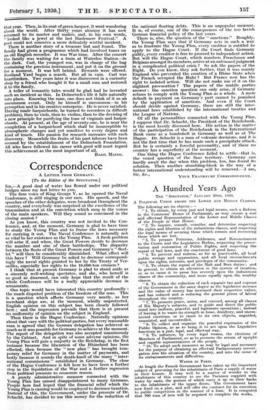Correspondence
A LETTER FROM GERMANY. [To the Editor of the SPECTATOR.] Sm,—A good deal of water has flowed' under our political bridges since my last letter to you. The firm voice of King George V, as he opened the Naval Conference, is still ringing in our ears. His speech, and the speeches of the other delegates, were broadcast throughout the country, and everybody was surprised at the excellence of the transmission and at the conviction which rang in the voices of the main speakers. Will they sound as convinced in the closing session ? As you know, this country was not invited to the Con- ference, and, at the moment, Germany is glad to have time to study the Young Plan and to frame the laws necessary for carrying it out. The Naval Conference is naturally not as vital to her existence as the Young Plan. A fresh problem will arise if, and when, the Great Powers decide to decrease the number and size of their battleships. The disparity between the fleets of the Great Powers and Germany's fleet- let " will then be considerably diminished. What effect will this have ? Will Germany be asked to decrease' correspond- ingly the naval rights granted to her by the Treaty of Vet:- sallies, especially her rights to the 10,000-ton cruisers ? I think that at present. Germany is glad to stand aside as a sincerely well-wishing spectator, and, she, who herself is as gOod as disarmed, can only hope that the result of the whole Conference will be a really appreciable decrease in armaments. One topic would have interested' this country profoundly the much disputed problem of the freedom of the seas. This is a question which affects Germany very nearly, as her merchant ships are, at the 'moment, wholly unprotected. English opinion on this subject has been closely followed here • and the inipression prevails that there is at present no uniformity of opinion on the subject in England. Then there is the Hague Conference. Naturally opinions about that vary with the political parties, but every reasonable man is agreed that the German delegation has achieved as much as it was possible for Germany to achieve at the moment. The report of the delegation was also accepted unanimously by the Cabinet. And in site of some adverse opinions, the Young Plan will gain a majority in the Reichstag, in the first instance because the liberation of the Rhineland has been effected, then because the " new plan " has brought tem- porary relief for Germany in the matter of payments, and lastly because it sounds the death-knell. of the many " inter- national commissions," established in Germany. The close of the Hague'Conference is felt here to have been a further step in theliquidation of the War and a farther regression from political pressure to economic reason. A purely administrative measure connected with the Young Plan has caused disappointment-to many Germans. People here had Wiped thatthe, financial relief which the Young Plan is dinging would be employed to decrease taxation. Instead of this, the Government,. under the. pressure of Dr. Schacht, has decided to use this money for the reduction of the national floating debts. This is an unpopular measure. It is, of course, one of the consequences of the too lavish German financial policy of the list years. There is, also, the question of the " sanctions." Roughly, the Young Plan says that if Germany acts in such a way as to frustrate the Young Plan, every creditor is entitled to Court. If the Court apply to the Hague Court finds Germany guilty, every creditor is free to proceed to independent action. But will the Hague Court, which numbers Frenchmenand Belgians amongst its members, arrive at an unbiassed judgment in a complicated political crisis ? So ask the papers of the Right. Do you know, they ask further, that it was mainly England who prevented the creation of a Rhine State when the French occupied the Ruhr ? But France now has the right to isolated action. Will she not make use of it on the slightest provocation ? The papers of the middle parties answer : the sanction question can only arise, if Germany refuses to comply with the Young Plan as a whole. A mere default in payment on Germany's part cannot be punished by the application of sanctions. And even if the Court should decide against Germany, there are still the inter- national laws established by the international treaties and the League of Nations. Of all the personalities connected with the Young Plan, I suppose that Dr. Schacht, the President of the Reichsbank, is the most keenly discussed here. His action in the matter of the participation of the Reichsbank in the International Bank came as a bombshell in Germany as well as at The Hague. Dr. Schacht is a man of volcanic decisions, and it is not the first time that he has made such a precipitate attack. But he is certainly a forceful personality, and of these no country has a superfluity at the moment. One thing the Hague Conference failed to settle—that is, the vexed question of the Saar territory. Germany can .hardly await the day when this problem, too, has found its solution. Then another stumbling-block in the way of a better international understanding will be removed.—I am, Sir, &c.,
YOUR FRANKFURT CORRESPONDENT.






































 Previous page
Previous page